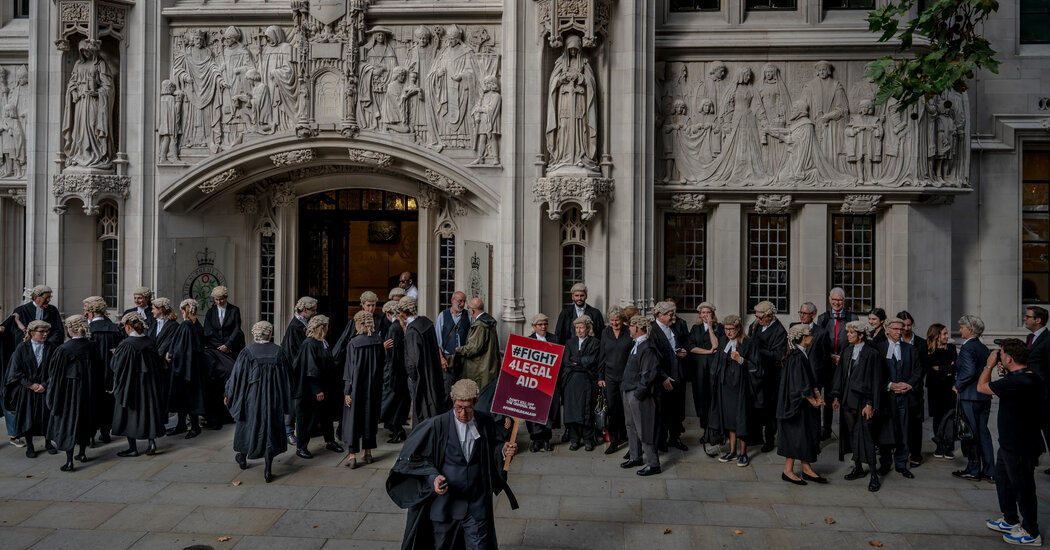Rarely do a brewery, a non-profit housing association and a pickle factory have much in common. But this week in Britain, workers on all three jobs were caught up in pay disputes. It is just the latest labor action that has gripped the country for months amid a deepening cost-of-living crisis.
Just under 200 workers at the Greene King brewery have gone on strike after rejecting a wage offer. More than 600 workers from the housing and homeless charity Shelter have begun a two-week strike, and about 50 workers from a Mizkan Euro factory that makes pickles and vinegar are walking out. Unite, the union representing these workers, has warned that there could be beer and pickle shortages during the holiday season.
But Britain is bracing for much worse. Workers in critical services, including nurses, ambulance workers and railway workers, are on strike, with strikes expected across all sectors every day until Christmas.
The scale of the labor action is the worst in Britain for nearly a decade and poses a new challenge to the government of Prime Minister Rishi Sunak, who took office in October and heads a country whose economy is already in recession and is not expected to will happen. grow again until 2024.
Public service officials have gone on strike or voted to demand higher wages as the country’s annual inflation rate topped 11 percent in October, the highest in 40 years. Rising food prices and utility bills are weighing on household budgets already vulnerable from years of low wage growth.
Demands for better pay for National Health Service teachers and employees clash with the government’s tight hand on the public purse. The Treasury has recently announced major tax increases and future spending cuts in a bid to restore UK fiscal credibility after Liz Truss’ stormy seven-week premiership.
Understand the political situation in Britain
Britain’s economic outlook is bleak. The Office for Budget Responsibility, an independent tax watchdog, predicted last month that living standards, as measured by disposable household income adjusted for inflation, would fall 7 percent over the next two fiscal years, the largest drop on records dating back to the the fifties.
Pay is at the center of these disputes – especially in the public sector, where the pay gap in the private sector has been the widest on record beyond the height of the pandemic – but there are also fears that some public services are being eroded by underfunding and that drastic measures should be taken to resolve them and recruit more workers.
Ambulance workers across England and Wales will go on strike on December 21, it was announced on Tuesday, and nurses are expected to leave their jobs in England, Wales and Northern Ireland on December 15 and 20. It will be the largest-ever strike by nursing staff, and the National Health Service is already dealing with a massive backlog in care. Meanwhile, ambulances are experiencing “crippling delays” when they try to transfer patients in hospitals due to a shortage of available beds, due in part to a lack of home care workers in communities.
Railway and Eurostar workers, bus drivers, Royal Mail postal workers, teachers in Scotland and even driving test examiners will also go on strike in the coming month. For many of these workers, this is the latest in a series of strikes. Britain’s train network has almost come to a standstill several times this year. This week the main railway union announced strikes from Christmas Eve, in addition to two 48-hour strikes next week.
In September, 205,000 working days were lost to labor disputes, according to the most recent data from the Office for National Statistics. While the numbers pale in comparison to the industrial action of the 1970s and 1980s, they show a sharp increase in strikes this year. The last time Britain lost so much working time to strikes was in 2014, when public sector concerted action protested wage freezes.
As Christmas approaches, the stakes seem to be getting higher and higher. Nick Gibb, a government minister, said in a radio interview on Tuesday that unions should not hold the country “to ransom” and urged the railway union to call off the Christmas strikes. But Mick Lynch, the head of the National Union of Rail, Maritime and Transport Workers, defended the move. He told the BBC on Tuesday that the government was coordinating an attack on working people.
“It would be foolish for unions not to coordinate in response to those attacks,” Lynch said.

